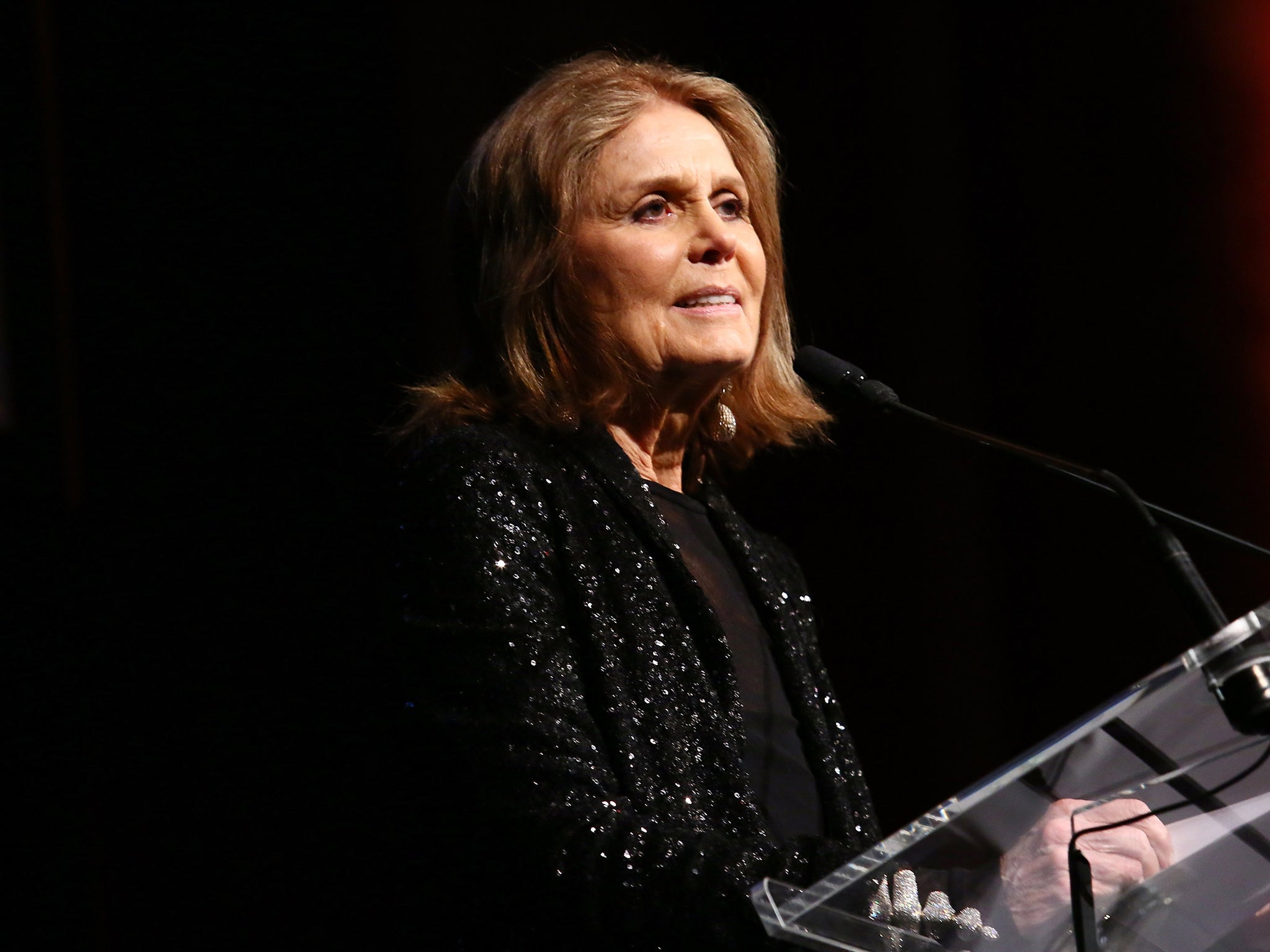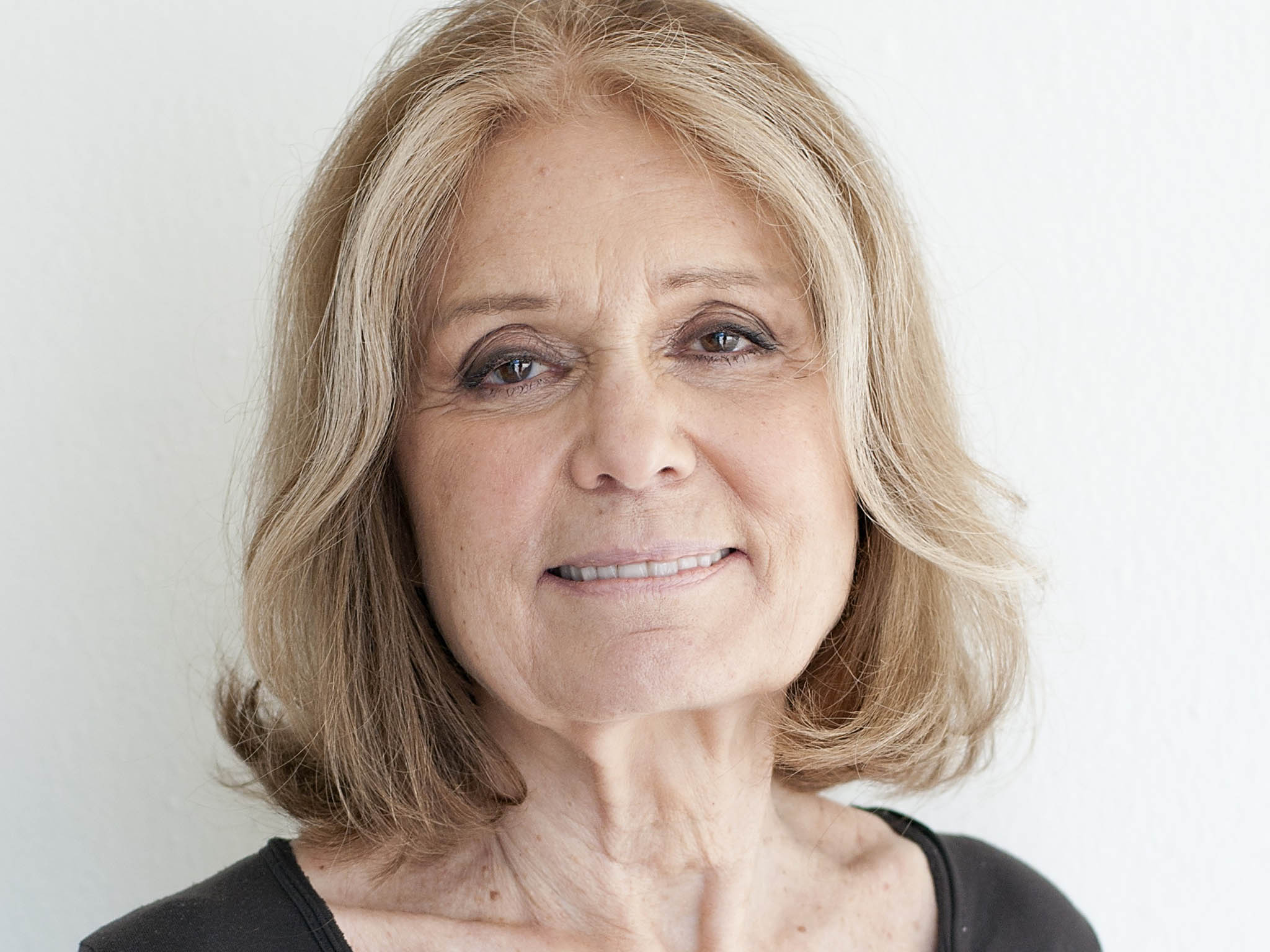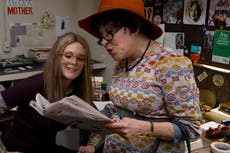Gloria Steinem: ‘The most dangerous time is after winning a victory’
Ann Hornaday talks to feminist icon Gloria Steinem about new biopic ‘The Glorias’, fighting for women’s rights over the last five decades and the hole left by Ruth Bader Ginsburg

Gloria Steinem laughs softly as she waves from her little black box on my laptop. “Gloria, it's come to this,” I say. “We're on Zoom.” “It's better than nothing,” she replies. “I miss seeing you.”
Beaming in from Santa Barbara, California, Gloria – I can't bring myself to call her Steinem, even in the newspaper – is doing press for The Glorias, a movie about her life directed by Julie Taymor.
We're part of a weekend publicity junket – just another writer interviewing the film's real-life subject, meeting virtually rather than in the usual beige hotel conference room.
But this time, the encounter will be more than a round of celebrity-journalist speed dating: our half-hour, free-ranging conversation will be part reunion, part therapy session, part organising meeting and part maternal pep talk.
I worked as Gloria's administrative assistant in the 1980s, just a few years after graduating from our alma mater, Smith College (Gloria was Class of '56). Although we occasionally crossed paths later on, this is the first chance we've had to catch up in a more meaningful way than a quick hug and “How are you doing?”
At the moment, I know, she could be doing better. It's the day after the death of her friend, Ruth Bader Ginsburg, and Gloria has been receiving nonstop condolences and frantic what-do-we-do-now please.
“It's very hard, because somehow I had persuaded myself that she would always be there,” says Gloria, who turned 86 in March. “We were only a year apart. Perhaps it's because we like to think we are immortal, so I thought she was immortal.”
And the what-we-do-now part? “Number one is getting out the vote in any way we can, and I'm glad that people are using this movie to get out the vote,” she says. “We were going to get on buses and actually criss-cross swing states. We're not doing that (because of the coronavirus pandemic). But it is being used as a fundraiser and a way of getting out the vote.”
After watching The Glorias, she says, “People can all have a Zoom meeting with their friends (and) plot the kind of activism that they have access to, think is important and can be effective in.

Watch Apple TV+ free for 7 day
New subscribers only. £9.99/mo. after free trial. Plan auto-renews until cancelled.
ADVERTISEMENT. If you sign up to this service we will earn commission. This revenue helps to fund journalism across The Independent.

Watch Apple TV+ free for 7 day
New subscribers only. £9.99/mo. after free trial. Plan auto-renews until cancelled.
ADVERTISEMENT. If you sign up to this service we will earn commission. This revenue helps to fund journalism across The Independent.
“The other thing is, if we say to ourselves, 'What would Ruth do?' and do it, then she will still be with us,” she says. “I just hope we don't get a case of the 'shoulds' - you know, 'What should I do?' – as opposed to saying, 'I'm just going to do everything I can, day by day by day.'”
To talk with Gloria Steinem, even when she's in the throes of grief, loss and uncertainty, is to be enveloped in her unique embrace: one of understanding and caring, but also steely, spine-straightening optimism. She's always been warm and confiding but, sometimes, remote and pragmatic to a fault; now, she seems more open and reflective.
The woman I remember sarcastically joking that “the examined life is not worth living” is willing to take time for the kind of introspection she once found either too self-indulgent or perhaps too uncomfortable to take seriously.

I show her a pin I'm wearing, a blue art nouveau butterfly she gave me for my birthday one year. “Oh, I remember that!” she says, brightening. “The butterfly is a very important symbol, you know. The flap of a butterfly's wing changes the weather hundreds of miles away.”
I never set out to become anyone's assistant, much less that of a beloved cultural icon, the co-founder of Ms. magazine and the most public face of the women's movement.
I met Gloria at Ms.'s Garment District office in Manhattan, where I became a researcher in 1982 and where she would waft through the halls, cadging the occasional snack and avoiding her latest deadline (“I do not like to write; I like to have written” is one of her most famous quotes).
After asking me to fact-check the final chapters of her 1983 essay collection Outrageous Acts and Everyday Rebellions, she treated me like a new old friend – which, I would soon discover, is how she treats just about everyone.
We shared a natural psychic bond: besides being Smithies, we both grew up in the Midwest (she in east Toledo, me in Des Moines) and put a premium on humour, the drier the better.
Not long after that fact-checking gig, Gloria floated the idea of my becoming her assistant. “I know you want to be a writer,” she assured me. “Just do it for two years and then go freelance. You might learn something.”
I had persuaded myself that she would always be there. Perhaps it’s because we like to think we are immortal, so I thought she was immortal
“How smart of me to say that,” Gloria says when I remind her of the advice that changed my life. I add that watching The Glorias, which stars Alicia Vikander and Julianne Moore as Gloria at different ages (Lulu Wilson and Ryan Kiera Armstrong play her as a child), revealed things I never knew about her – or was too distracted to ask.
She has spoken movingly about her mother, Ruth, whose mental illness thrust Gloria into a difficult caretaking role through her teens. But I rarely heard about her father, Leo, an itinerant antiques dealer, inveterate showman and compulsive free spirit who took her along on his frequent road trips.
“He was one of the most irresponsible people on Earth, and it didn't matter,” Gloria recalls fondly. “Because he was kind, he was funny, he treated me as his buddy and his companion. I am personally thankful to him that I'm friends with all my old lovers, because they were good men. [And] because I had a good father I knew they were good men.”
Leo Steinem was also the person who introduced Gloria to the peripatetic life that, when I worked with her, meant constantly typing up travel schedules and dropping things off at her Upper East Side apartment, which always looked either half-moved-into or half-moved-out-of.
In The Glorias, Timothy Hutton plays Leo with expansive good humour and que-sera-sera fatalism; watching him, I sensed a direct link between his footloose independence and Gloria's urging me to freelance.

“My father had two points of pride,” Gloria explains. “He never wore a hat, which in his era one was supposed to do. And he never had a job. He was very proud of that. By which he meant, no one could ever fire him. I think that's the joy of being a freelancer. It might be a little harder to pay the rent sometimes, but you're free. No one can fire you.”
Taymor, best known for such visually bold films as Frida and Across the Universe, directs The Glorias as a time-shifting chronicle of Gloria's life and career, adding magical realist touches to reflect her evolving consciousness.
Watching it will likely be both gratifying and deeply disorienting for anyone who has spent time with the real person, who comes into vivid focus one moment (Moore flawlessly executes Gloria's signature hand-over-heart gesture when she speaks), only to recede the next.
Gloria has been portrayed on screen before, most recently by a strangely recessive (and horribly bewigged) Rose Byrne in the miniseries Mrs America. Christine Lahti played her in the off-Broadway play Gloria: A Life.
As fine as some of those performances have been, no one has accurately captured her throaty, sotto voce verbal style or mordant wit. When people hear that I worked for her and ask me what she's like, I often resort to shorthand: imagine the ideal combination of Eleanor Roosevelt, Dorothy Parker and Holly Golightly, and you get the idea.
As for what I was like back then, the combination was closer to Anne Hathaway in The Devil Wears Prada (with a far funnier and more humane boss) and Mickey Mouse in The Sorcerer's Apprentice, but even more haplessly over my head.
When people hear that I worked for her and ask me what she's like, I often resort to shorthand: imagine the ideal combination of Eleanor Roosevelt, Dorothy Parker and Holly Golightly, and you get the idea
Gloria was under enormous pressure in the 1980s, a period when she was continually trying to bring Ms. back from the financial brink (the magazine had gone nonprofit, making it possible to accept donations, but still suffered from companies' unwillingness to advertise in a women's publication that didn't emphasise fashion or makeup or homemaking).
When she wasn't raising money, she was answering requests to speak, physically or symbolically showing up for endless good causes, and desperately trying to get her own writing finished, despite her penchant for procrastination.
She struck me then as a natural solitude-seeker who had been ironically blessed with a gift for connection; I spent most of the time answering calls (“hatching the phone,” Gloria called it), responding to mail and doing my best to tell people no on behalf of someone with a weakness for saying yes.
Moore depicts those stresses with weary fortitude in The Glorias, in which the four versions of Gloria eventually intersect, representing not just the serial selves we all contain, but the healing power of integrating and, when necessary, forgiving them.
Watching her struggle on screen, and looking back at the naive, self-absorbed version of me in my Ms. days, I see a young woman incapable of properly supporting someone who deserved a stronger protector.
“That's such a lovely thing to say," Gloria says when I tell her I wish I could have taken better care of her. "I really appreciate that. As I say at the end of [My Life on the Road, the 2015 autobiography from which The Glorias is adapted], even birds have nests. It took me a while to realise that. I did come to the end of my ability to be flat-out travelling, active, on-the-road all the time and began to look for balance.”

In Gloria's case, balance has also meant boundaries, which she has strengthened with the help of Soapbox, the feminist event-production company and lecture bureau founded by her onetime assistant and now-colleague Amy Richards.
Together they keep “long lists of people who we can refer people to. That's crucial because we want the requests to be met, but we want continuously new and different and diverse people to be introduced. So I hope and believe that we've become better at that. But I do, on my bulletin board at home, have a big sign that says 'No is a complete sentence.'”
Inevitably, The Glorias entails moments of what Gloria likes to call “surrealism in everyday life”. Take, for example, the elastic nature of time: I'm now 10 years older than Gloria was when we celebrated her 50th birthday at the Waldorf-Astoria, where Bette Midler performed a raucously ribald set, at one point letting go of her balloon “breasts” and sending them straight towards Rosa Parks. (Even more surreally, that same party, which Gloria insisted be held as a fundraiser for Ms., is re-created in The Glorias, this time with Midler playing Bella Abzug.)
The 1977 National Women's Conference in Houston, where thousands of women gathered from around the country to produce a “plan of action” on a range of topics including credit reform, equal pay, lesbian rights and respect for homemakers, was ancient history to 23-year-old me, but just yesterday for Gloria and her co-organisers.
The same was true of the heartbreaking defeat of the Equal Rights Amendment, which I had barely noted, much less internalised. When Gloria and I attended the 1984 Democratic National Convention, where Geraldine Ferraro became the first woman to be nominated by a major party for vice president, I blithely believed, like so many young women of my generation, that progress was constant, forward-moving and assured.

“I think we need to understand that there are economic powers that run counter to democratic person-by-person power,” Gloria says, explaining why it's taken so much longer to transform social structures than hearts and minds.
“And, also, that once we have a majority change in consciousness, which we have had, there comes a backlash. I fear that sometimes we have a victory and we relax, instead of understanding that the most dangerous time is after a victory. So, after eight years of Obama, something like a third of the country that (still) believes in the old hierarchy (has been) in backlash.”
She sees a paradigm in fleeing domestic violence: “The most dangerous time for a woman is just at the time of escape,” she explains. “Because she's escaping control. That's when she's most likely to be beaten or murdered. And, in a sense, the majority of the country is escaping control. So we're at a time of maximum danger.”
On this day, at least for feminists mourning their most reliable champion on the Supreme Court, “maximum danger” might be an understatement. At one point, Gloria emphasises that “we need to make sure” that Ginsburg's dying wish to not be replaced until after the 2021 inauguration be honoured.
It's only one week later that President Donald Trump nominates Judge Amy Coney Barrett – who opposes Roe v. Wade and is expected to support rollbacks in anti-discrimination laws – to fill the seat.
At times like these, the world comes to Gloria for advice and comfort. But where does she turn? She mentions the “chosen family” she has found in the global women's movement, as well as her more “immediate family” – a core group that includes former Ms. colleagues Suzanne Levine, Joanne Edgar and Robin Morgan, authors Alice Walker and Bell Hooks and the activist Dolores Huerta, among others.
“That's crucial,” Gloria says of her inner circle. “Because they support you when you're feeling down (and) they tell you when you're (messing) up, which is really important. And it's especially helpful if your immediate family is somewhat diverse, because we learn from difference, not sameness.”
Even Gloria's closest friends may find they learn something new about her in The Glorias. For her part, she says, the scenes depicting her relationship with her mother were the most revelatory “because it's (about) what my mother could have done. And that's true, I think, in a lot of our families. 'What might have been' is the saddest phrase”.
As she watched the film, she says, “I realised that I hadn't dealt with the sadness about my mother. I realised that I needed to think more about really creating a home, because I could see the price of not having a nest. I did learn from it. And I probably will continue to learn from it. Don't you learn from things you've written in the past?”
I tell her that I rarely reread my old articles. It's too painful. All I see is what I did wrong or should have done differently. Gloria listens, nodding sympathetically. And then, before signing off, she imparts one more piece of advice: ”Wait a while.”
© The Washington Post
Join our commenting forum
Join thought-provoking conversations, follow other Independent readers and see their replies
Comments



Bookmark popover
Removed from bookmarks